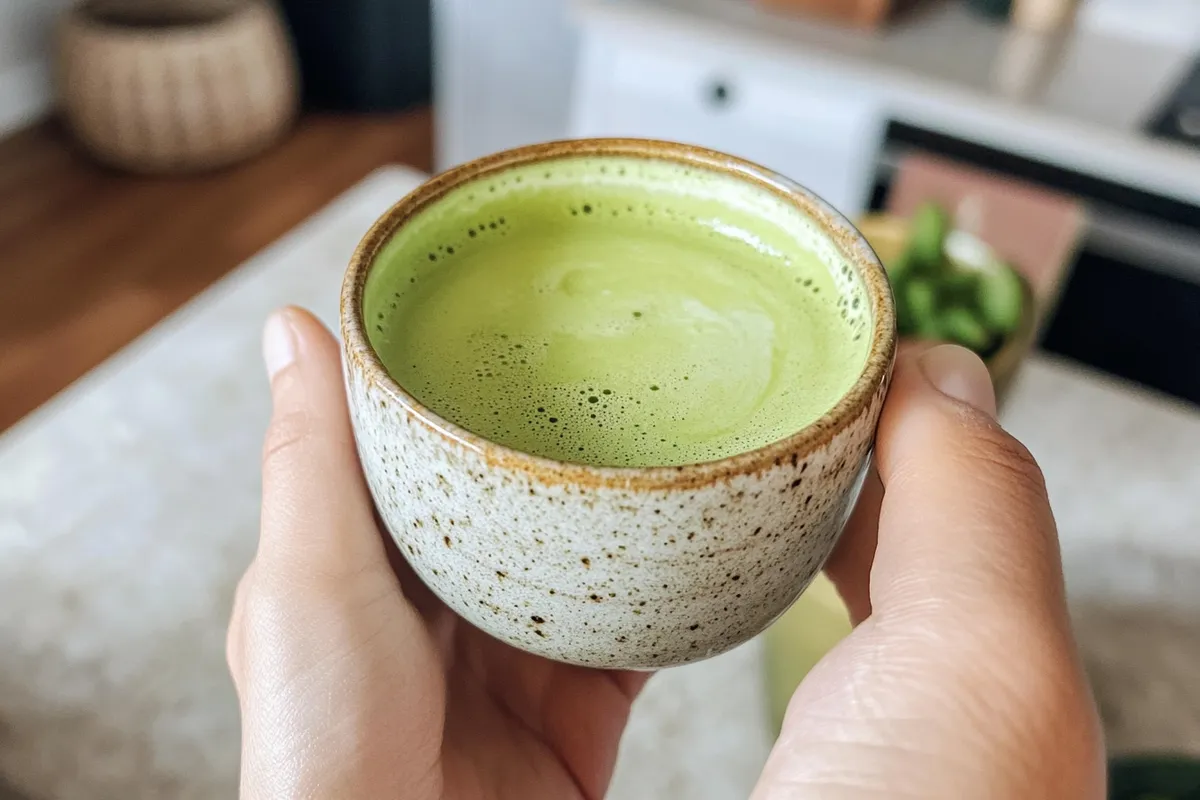Introduction
Matcha lattes have become a popular trend in the wellness world. You can find them in coffee shops, fitness blogs, and on Instagram. But one question still stands: are matcha lattes actually good for you?
These lattes are often seen as a healthier option than coffee or sugary drinks. However, it’s important to look at both the benefits and potential downsides. In this article, we’ll dive into everything you need to know. We’ll cover health benefits, possible side effects, and whether matcha lattes should be part of your daily routine.
What Is a Matcha Latte?
If you’ve ever strolled past a trendy café, chances are you’ve seen a matcha latte on the menu. But what exactly is a matcha latte, and how does it differ from other beverages?
A matcha latte is a combination of matcha powder, steamed milk (or dairy-free alternatives), and sometimes sweeteners like honey or agave. Matcha itself is finely ground powder made from high-quality green tea leaves, offering a unique earthy flavor that’s both bold and rich. Unlike regular green tea, which is steeped and then discarded, matcha is consumed in its whole form, which means you’re getting all of the nutrients and antioxidants the tea leaves have to offer.
The drink is typically served warm but can also be enjoyed cold, making it a versatile choice for any season. It’s often marketed as a healthier alternative to traditional coffee-based drinks, thanks to the natural green tea benefits it offers.
Why Are Matcha Lattes So Popular?
In recent years, matcha lattes have surged in popularity, especially within the wellness community. So, what’s behind this global obsession with matcha?
- The Rise of Health Trends
With increasing interest in superfoods, green tea, and plant-based diets, matcha has become a sought-after drink for those looking to boost their health and well-being. Many consider matcha lattes an excellent way to enjoy a delicious drink while reaping the benefits of matcha’s antioxidants and nutrients. - Social Media and Influencers
Social media platforms like Instagram have played a significant role in the rise of matcha lattes. Beautifully vibrant and photogenic, matcha lattes are perfect for sharing on social feeds, further fueling their popularity. - A Healthier Alternative to Coffee
For many, matcha lattes offer a natural caffeine boost without the jitters or crashes associated with coffee. This makes matcha a perfect choice for those looking for a gentler, longer-lasting energy boost. Additionally, it’s often seen as a “cleaner” option, offering a beverage with fewer processed ingredients compared to other trendy drinks.
Health Benefits of Matcha Lattes
When it comes to matcha lattes, one of the most compelling reasons for their popularity is their health benefits. Let’s break down why many consider them a better-for-you option compared to other beverages.
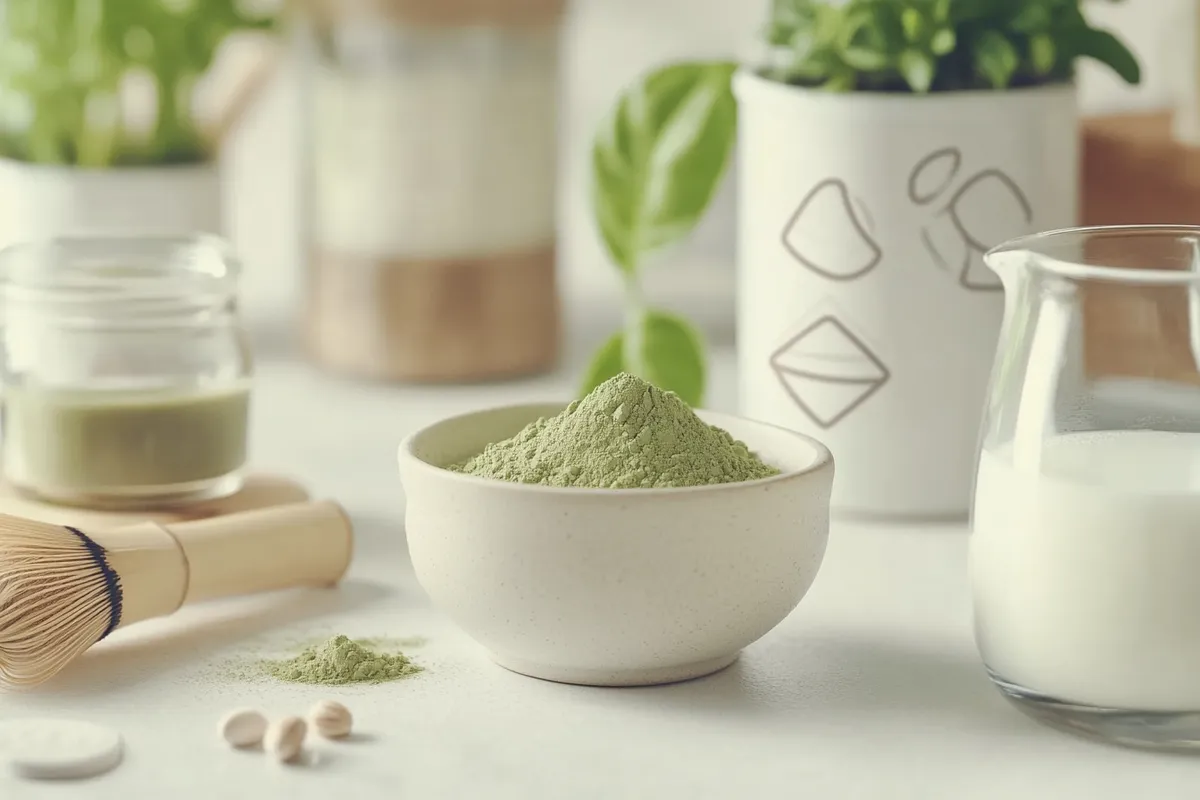
Rich in Antioxidants
Matcha is rich in antioxidants. These antioxidants fight free radicals and reduce oxidative stress in your body. They are crucial for overall health.
The key antioxidants in matcha are catechins, which have anti-inflammatory properties and help fight aging. Matcha contains more antioxidants than regular green tea.
The most important antioxidant is EGCG (epigallocatechin gallate). EGCG supports heart health and lowers the risk of chronic diseases. When you drink a matcha latte, your body absorbs these antioxidants easily. They help protect your cells and reduce inflammation.
So, when you enjoy a matcha latte, you’re not only having a tasty drink. You’re also getting a healthy dose of antioxidants to support your health.
Boosts Energy and Mental Clarity
Another key reason people gravitate towards matcha lattes is the energy boost they provide. Unlike coffee, which delivers a quick surge of energy followed by a crash, matcha offers a sustained release of energy due to its unique combination of caffeine and L-theanine.
L-theanine, an amino acid found in matcha, works synergistically with caffeine to create a calm yet alert feeling. This means that matcha provides a smoother, more stable boost of energy without the jittery feelings that some people experience after drinking coffee. Additionally, L-theanine has been shown to promote mental clarity and improve focus, which is why matcha lattes are often favored by those who need to concentrate for long periods, such as students or professionals.
This combination of natural caffeine and L-theanine can also have a positive effect on mood, making matcha lattes a great option for those looking to enhance their productivity and mental well-being.
Supports Weight Loss
If you’re aiming to shed a few pounds or maintain a healthy weight, matcha lattes might be able to help. Some studies suggest that the catechins in matcha can increase fat oxidation and boost metabolism, which may contribute to weight loss.
Matcha has also been shown to enhance the burning of calories during exercise, making it a popular drink for fitness enthusiasts looking to maximize their workout results. However, it’s important to note that while matcha lattes can support weight loss, they are not a magic solution on their own. To see significant benefits, they should be paired with a healthy diet and regular exercise routine.
By incorporating matcha into your daily routine, you may be giving your metabolism a gentle push in the right direction, helping you maintain a healthy weight in the long run.
Boosts Immunity
Another major benefit of matcha is its potential to boost your immune system. Because matcha is packed with powerful antioxidants, it can help strengthen your body’s defenses against harmful bacteria and viruses. The antiviral and antibacterial properties of matcha may also reduce the risk of infections and illnesses.
Some studies have also indicated that matcha may help reduce inflammation in the body, which is key to maintaining a healthy immune system. So, if you’re looking for an extra layer of defense during cold and flu season, adding a matcha latte to your daily routine could be a smart choice.
Improves Skin Health
When it comes to skin health, matcha lattes can be beneficial as well. The antioxidants in matcha help protect the skin from UV damage, preventing premature aging and reducing the appearance of wrinkles and fine lines. Additionally, matcha’s anti-inflammatory properties may help soothe irritated skin, reducing redness and puffiness.
Some studies even suggest that drinking matcha may help reduce acne by regulating blood sugar levels and lowering inflammation. If you’re looking for a glowing complexion, matcha lattes may provide the nourishment your skin needs to look its best.
Potential Drawbacks and Considerations of matcha latte
While the health benefits of matcha lattes are certainly impressive, it’s essential to consider potential drawbacks and factors that could impact your well-being. Just like with any popular beverage, there are some things to keep in mind before you make matcha lattes a daily habit. So, are matcha lattes actually good for you? Let’s take a closer look at a few considerations to ensure you’re making the best choice for your health.
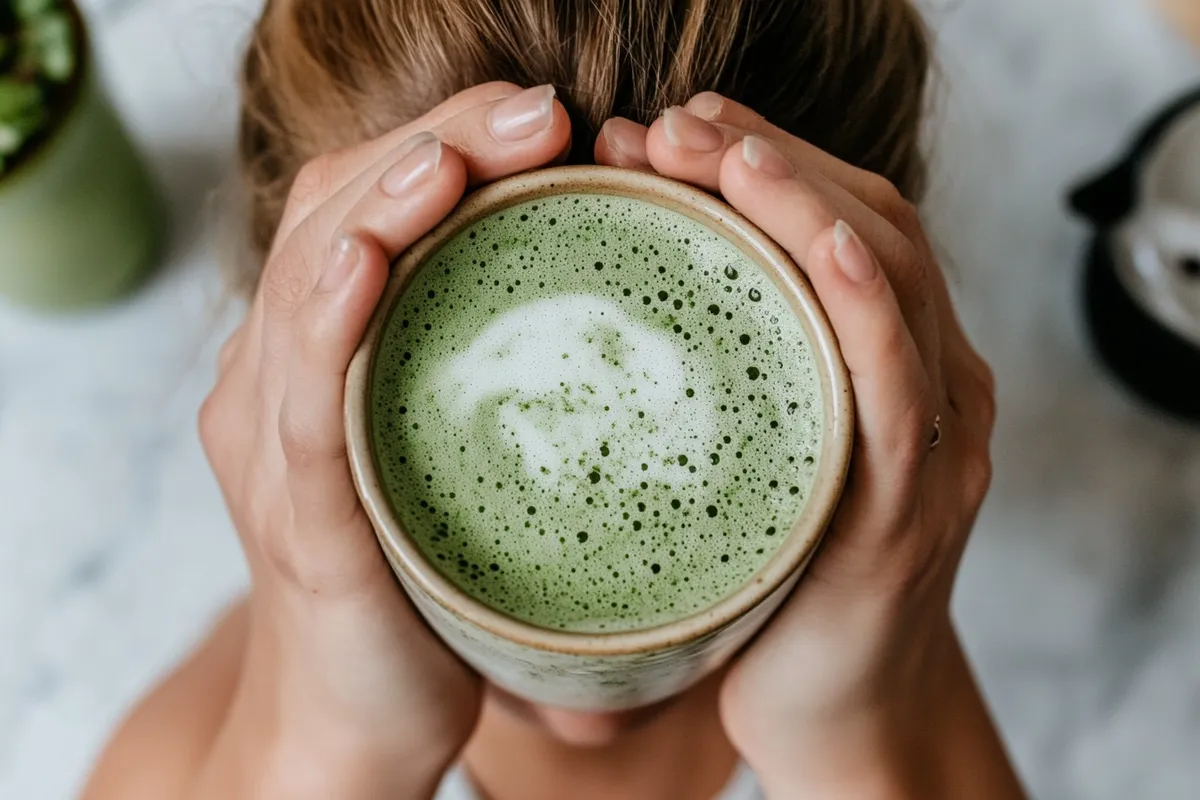
Too Much Caffeine?
One of the most notable aspects of a matcha latte is the caffeine content. While matcha provides a more balanced energy boost compared to coffee, it still contains caffeine, which means drinking too much could potentially lead to negative effects.
A typical serving of matcha contains about 70 mg of caffeine, compared to 95 mg in a cup of coffee. While this difference might not sound huge, the effect it has on your body can vary depending on how sensitive you are to caffeine. For some people, this moderate amount of caffeine is enough to trigger jitters, anxiety, or sleep disturbances. If you’re prone to being over-caffeinated, it’s essential to monitor your intake, especially if you’re drinking other caffeinated beverages throughout the day.
Moreover, some individuals may have a low caffeine tolerance, and excessive consumption may cause side effects like restlessness, rapid heartbeat, or digestive discomfort. For those with caffeine sensitivities, it’s a good idea to limit the number of matcha lattes you consume, or even opt for a matcha latte made with a reduced amount of matcha powder.
Sugar Content in Commercial Matcha Lattes
If you’re getting your matcha lattes from a café or store, it’s important to be aware of the sugar content. While the matcha itself is naturally low in calories and free of sugar, many commercially prepared matcha lattes are loaded with added sugars or syrups to make them taste sweeter. Some larger chain stores use syrups or pre-sweetened matcha powder, which can significantly increase the sugar intake in your latte.
The problem is that when you add too much sugar, you negate many of the health benefits that matcha offers. Too much sugar can contribute to weight gain, increase the risk of developing chronic diseases like diabetes, and lead to blood sugar imbalances. Even if you’re drinking a matcha latte for its health benefits, consuming it with high sugar content can make it less of a healthy choice.
If you want to make your matcha lattes healthier, consider opting for unsweetened matcha or using natural sweeteners like honey, maple syrup, or stevia in moderation. By taking control of the sugar content, you can keep your matcha latte both delicious and good for your health.
Possible Contaminants in Low-Quality Matcha
Not all matcha powders are the same. The quality of matcha in your latte affects its health benefits. Low-quality matcha can contain lead or other harmful metals, which the plant can absorb during growth. Consuming this contaminated matcha can lead to health risks over time.
To avoid these risks, choose high-quality matcha from trusted sources. Organic matcha is a better choice since it’s grown without pesticides, making it safer. When shopping for matcha, pick brands that are transparent about where their matcha comes from. They should also test their products for contaminants. Investing in premium matcha is worth it for your health.
Digestive Concerns and Allergies
Drinking a matcha latte can cause digestive issues or allergic reactions for some people. This is especially true if the latte contains dairy or certain additives. Many store-bought matcha lattes use milk or milk alternatives. These can cause discomfort for those with lactose intolerance or dairy allergies.
Some people may also be sensitive to matcha’s compounds, like catechins. In large amounts, they can irritate the stomach. If you have a sensitive stomach or digestive issues, try using less matcha powder or a milder blend. If you experience bloating or cramps, consider using dairy-free milk, like almond or oat milk. These are easier on the digestive system.
If you’re allergic to certain ingredients, always check the labels. You can also make your own matcha latte at home. Using high-quality matcha powder and dairy-free alternatives ensures a more customized, allergy-friendly drink.
Comparison with Other Popular Beverages
When considering whether matcha lattes are actually good for you, it’s helpful to compare them with other popular beverages. While matcha lattes have become a favorite in the health and wellness world, how do they stack up against classic drinks like coffee, green tea, and herbal teas? Let’s explore how matcha lattes compare in terms of taste, health benefits, and caffeine content.
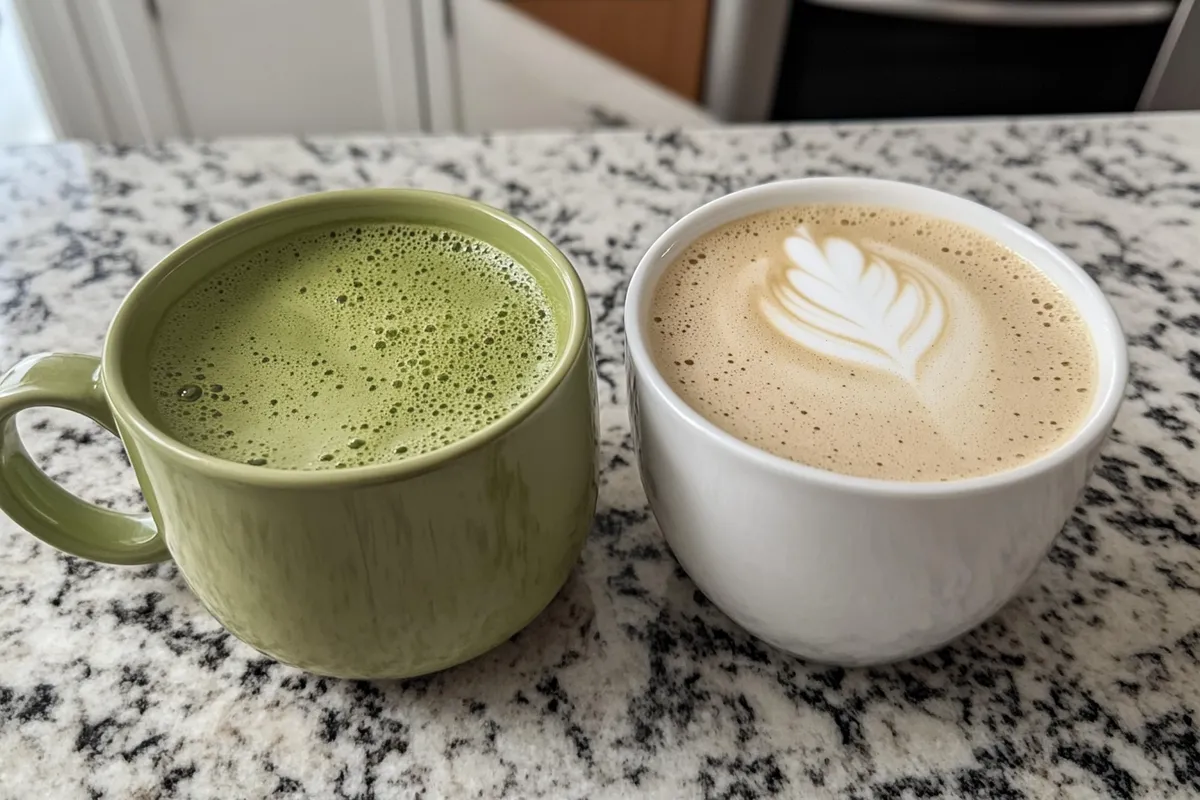
Matcha Lattes vs. Coffee
One of the main reasons people turn to matcha lattes is as a healthier alternative to coffee. While both beverages provide a caffeine boost, there are notable differences in how they affect the body.
- Caffeine Comparison: Matcha lattes contain less caffeine than coffee, offering about 70 mg per serving, compared to around 95 mg in a typical cup of coffee. This means that while both drinks provide a pick-me-up, the matcha latte delivers a more gradual, sustained energy boost. Coffee, on the other hand, often results in an intense surge of energy followed by a rapid crash.
- Energy and Mental Clarity: The caffeine in matcha is paired with L-theanine, an amino acid that promotes calm and focus, resulting in a more balanced and mental clarity effect. Coffee, although it provides a quick energy boost, is more likely to cause jitters or anxiety due to its higher caffeine content, especially in individuals who are sensitive to caffeine.
- Health Benefits: Matcha has a significant advantage when it comes to antioxidants, as it contains a higher level of catechins (particularly EGCG) than coffee. These antioxidants help protect against free radicals, improve heart health, and promote longevity. While coffee also offers health benefits such as reduced risk of certain diseases, it doesn’t pack the same antioxidant punch as matcha.
Thus, if you’re seeking a smoother, longer-lasting energy boost without the crash, matcha lattes might be the better choice, especially for those who are more caffeine-sensitive.
Matcha Lattes vs. Green Tea
At first glance, matcha lattes and green tea might seem quite similar, as they both come from the same plant—Camellia sinensis. However, there are key differences in how they’re prepared and what health benefits they offer.
- Antioxidant Levels: Both matcha and green tea are rich in antioxidants, but matcha is more concentrated. With matcha, the whole tea leaf is ground into powder and consumed, so you get a higher dose of catechins and other beneficial compounds. Green tea, however, is steeped, meaning many of its nutrients are left behind. So, matcha gives you a stronger dose of antioxidants, especially EGCG.
- Health Benefits: Green tea offers health benefits like supporting weight loss, boosting heart health, and improving brain function. But matcha provides even more. It has additional nutrients and a higher concentration of antioxidants and anti-inflammatory compounds. If you want a bigger health boost, matcha lattes are the better choice.
- Caffeine: Green tea has less caffeine than matcha. If you’re looking for a mild energy boost, green tea is a good option. However, if you need a stronger, more sustained energy lift, matcha is the way to go.
Ultimately, both beverages are great choices for those looking to improve their health, but matcha offers a higher antioxidant content and more potent health benefits than regular green tea.
Matcha Lattes vs. Herbal Teas
Herbal teas such as chamomile, peppermint, and ginger are caffeine-free and widely known for their relaxing properties. But how do they compare to matcha lattes in terms of energy, taste, and health effects?
- Energy Levels: Herbal teas lack caffeine, so they won’t give you the same energy boost as matcha lattes. For those avoiding caffeine, herbal teas offer a calming, soothing option. Chamomile helps promote relaxation and better sleep, while peppermint supports digestion and has a refreshing flavor.
- Health Benefits: Herbal teas provide specific health perks based on their ingredients. Chamomile can ease anxiety and improve sleep. Peppermint aids digestion and can soothe headaches. On the other hand, matcha delivers a wider range of benefits, like antioxidants, immune support, and help with weight loss. While matcha’s benefits are more general, herbal teas often target particular needs, such as relaxation or stomach relief.
- Taste: Herbal teas are lighter and more delicate in flavor, whereas matcha lattes are rich and slightly bitter. If you enjoy matcha’s earthy taste combined with creamy milk, you’ll likely prefer a matcha latte. Herbal teas, however, are a better fit for those seeking gentler, more subtle flavors.
If you’re looking for a refreshing, caffeine-free alternative for relaxation, herbal teas are a great option. But if you want a beverage that packs in both energy and health benefits, a matcha latte is the way to go.
The Popularity of Plant-Based Alternatives
One of the most appealing aspects of matcha lattes is the ability to customize them with various plant-based milks. Whether you’re lactose intolerant, vegan, or simply looking to try something new, there are numerous dairy-free options to choose from. Almond, oat, and soy milks are particularly popular choices for matcha lattes.
- Oat Milk: Known for its creamy texture and naturally sweet flavor, oat milk is a top choice for many when making matcha lattes. Its consistency pairs well with the richness of matcha, creating a smooth, indulgent drink.
- Almond Milk: With a slightly nutty flavor and lower calorie content, almond milk is another great alternative for a matcha latte. It complements matcha’s natural earthiness without overpowering its flavor.
- Soy Milk: Soy milk is another plant-based option that adds a mild creaminess to matcha lattes. It’s a good source of protein, making it a satisfying addition to your latte.
The rise of plant-based milks has made matcha lattes more popular. They provide healthier, dairy-free options for people with dietary restrictions.
When compared to other drinks like coffee, green tea, and herbal teas, matcha stands out. It offers a steady energy boost and more antioxidants. Matcha also has a wider range of health benefits than coffee and green tea. Herbal teas may be better for specific health needs or caffeine-free options. But matcha lattes provide more advantages, especially for those seeking a healthy energy drink.
With the popularity of plant-based milks, matcha lattes can fit nearly any diet or preference.
Frequently Asked Questions (FAQs)
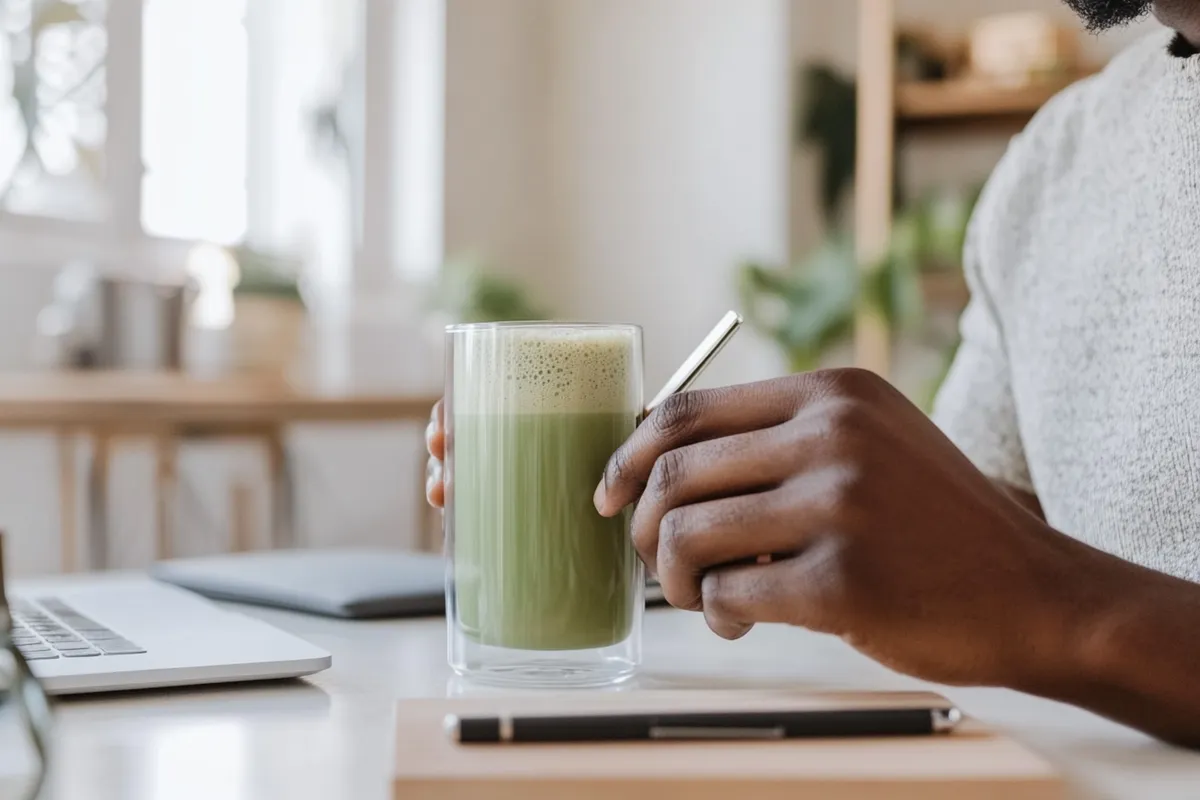
Are Matcha Lattes Healthier Than Coffee?
Are matcha lattes actually good for you? Compared to coffee, matcha lattes offer several health benefits. They contain more antioxidants, like EGCG, which help fight free radicals and protect the body from aging. While coffee may provide a quick energy boost, matcha delivers a more stable energy increase due to the combination of caffeine and L-theanine, a calming amino acid. Additionally, matcha is less likely to cause a caffeine crash than coffee.
Can Matcha Lattes Help With Weight Loss?
Yes, matcha lattes may aid in weight loss. The catechins in matcha help boost metabolism and enhance fat-burning processes. By increasing calorie expenditure, matcha can support weight management, especially when combined with a healthy diet and regular exercise.
How Much Caffeine is in a Matcha Latte?
A typical matcha latte contains about 70 mg of caffeine, which is less than a standard cup of coffee (95 mg). The lower caffeine content provides a gentler, more sustained energy boost, without the jitters or crashes often associated with coffee.
Are Matcha Lattes Good for Skin Health?
Yes, matcha lattes are great for skin health. The antioxidants in matcha, particularly EGCG, help protect the skin from UV damage, reduce inflammation, and fight signs of aging. Drinking matcha regularly can contribute to a healthier, more radiant complexion.
What Are the Best Ingredients for a Healthy Matcha Latte?
Make a healthy matcha latte by using good-quality matcha powder and unsweetened plant-based milk like almond, oat, or soy milk. For sweetness, choose natural options like honey or stevia. Skip sugary syrups to keep it nutritious.
Is it Good to Drink Matcha Latte Every Day?
Drinking a matcha latte every day can be good for you if you don’t overdo it. It provides antioxidants, boosts mental focus, and helps your metabolism. Just watch your caffeine intake, especially if you drink other caffeinated drinks.
What Are the Cons of Matcha Lattes?
Matcha lattes offer many benefits but also have some downsides. Drinking too much can lead to high caffeine intake. Store-bought matcha lattes often have added sugars that reduce their health value. Low-quality matcha powders might also contain harmful heavy metals.
Why Are Matcha Lattes So High in Calories?
Matcha lattes can pack extra calories based on the milk and sweeteners you use. Dairy milk and sugary syrups add a lot of calories. To keep your latte lighter, go for unsweetened plant-based milk and skip the sugar or syrups.
Conclusion
So, are matcha lattes actually good for you? Yes, but with a few things to keep in mind. Matcha lattes are rich in antioxidants. They give you a gentle energy boost and help improve mental clarity. The catechins in matcha, like EGCG, fight free radicals and boost metabolism. They also benefit skin health. With lower caffeine than coffee, matcha lattes are a great option for those seeking a healthier energy drink.
That said, there are a few drawbacks to consider. Many commercial matcha lattes contain added sugar, which can reduce their health benefits. Drinking too much caffeine, even from matcha, can cause discomfort, especially if you’re sensitive to it. To get the best benefits, choose high-quality matcha and limit the sugar.
In conclusion, when enjoyed in moderation and made with healthy ingredients, matcha lattes can be a great addition to your routine. They offer many health benefits, like boosting metabolism and improving skin health. Just keep an eye on the sugar and caffeine levels to fully enjoy the benefits of your matcha latte.

